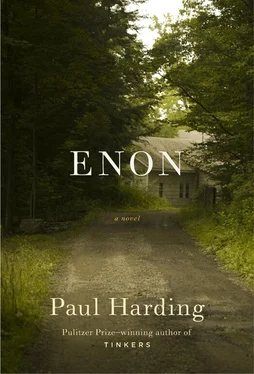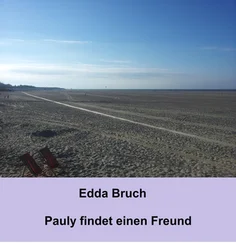Paul Harding - Enon
Здесь есть возможность читать онлайн «Paul Harding - Enon» весь текст электронной книги совершенно бесплатно (целиком полную версию без сокращений). В некоторых случаях можно слушать аудио, скачать через торрент в формате fb2 и присутствует краткое содержание. Жанр: Современная проза, на английском языке. Описание произведения, (предисловие) а так же отзывы посетителей доступны на портале библиотеки ЛибКат.
- Название:Enon
- Автор:
- Жанр:
- Год:неизвестен
- ISBN:нет данных
- Рейтинг книги:3 / 5. Голосов: 1
-
Избранное:Добавить в избранное
- Отзывы:
-
Ваша оценка:
- 60
- 1
- 2
- 3
- 4
- 5
Enon: краткое содержание, описание и аннотация
Предлагаем к чтению аннотацию, описание, краткое содержание или предисловие (зависит от того, что написал сам автор книги «Enon»). Если вы не нашли необходимую информацию о книге — напишите в комментариях, мы постараемся отыскать её.
Powerful, brilliantly written, and deeply moving Paul Harding has, in Enon, written a worthy successor to Tinkers, a debut which John Freeman on NPR called "a masterpiece." Drawn always to the rich landscape of his character's inner lives, here, through the first person narrative of Charlie Crosby (grandson to George Crosby of Tinkers), Harding creates a devastating portrait of a father trying desperately to come to terms with family loss.
Enon — читать онлайн бесплатно полную книгу (весь текст) целиком
Ниже представлен текст книги, разбитый по страницам. Система сохранения места последней прочитанной страницы, позволяет с удобством читать онлайн бесплатно книгу «Enon», без необходимости каждый раз заново искать на чём Вы остановились. Поставьте закладку, и сможете в любой момент перейти на страницу, на которой закончили чтение.
Интервал:
Закладка:
3
I USED TO WAKE UP BEFORE KATE AND SUSAN ON SUNDAY mornings. I’d get a pot of coffee going and fetch the Sunday paper from the end of the driveway, wondering each time why the delivery guy couldn’t just chuck it farther toward the back door. When it was warm, I’d pour a cup of strong coffee with some milk and sit outside at the table on the side deck, under the umbrella, in one of the cheapo, stackable green plastic chairs I’d bought on sale at a hardware store. I’d smoke a cigarette and flip through the paper, looking at the sports pages first, then the book section, then the real estate listings.
Kate would usually come down half an hour later, in sweat shorts and a three-quarter-sleeved baseball shirt, her hair snarled, her eyes a little puffed, with a sleepy half-smile. She’d plunk herself into the chair across from me and swivel sideways in the seat and dangle her legs over one armrest and lean her back against the other.
“Hey, Dad.”
“Hey, kid. How you doing?” She made little swimming kicks with her legs and yawned. I stopped myself from warning her about how tippy those crummy chairs were. She knew and I’d told her a hundred times and anyway she never once toppled in one.
“I’m good,” she said. She arched her back and stretched her arms behind her head and yawned again. I could never get really comfortable in those chairs and I wondered at how easy Kate seemed in hers. I realized that her comfort came not from the chair but from being young and limber and strong. Jesus, I thought, what a beautiful kid.
“Can I have a sip?” Kate said. She sat up and half-reached for my coffee. I didn’t like the idea of her drinking coffee but I liked the idea of her wanting to. I guess it seemed like a nice, safe sort of way for a kid to push a bit at the doors of adulthood. It was a little ritual we had.
“It’s like mud,” I said. “Gravelly.”
“I know, I know; it’s your rocket fuel.” She took the mug and looked in it and crinkled her nose at the grounds floating on the surface and took a sip.
“Blech.” She handed it back.
“Told you.”
“Mah, mah,” she mimicked. “Are there any yard sales?”
“Check it out,” I said, and pulled out the classified section and tossed it to her. That was a ritual, too, her asking me about the yard sales and me having her check the paper for us. I deliberately never looked before she woke up. She opened the paper and laid it out across the table, leaned her face close to it, and followed the listings with her index finger. I wondered whether she might be farsighted.
“Junk, crap, junk, junk,” she said as she worked her way down the list. “Hey, an estate sale, over off Ash Street.”
“That might be good.”
“Books and records for you, maybe.”
“And maybe you’ll find Hector’s brother, or one of his cousins,” I said. Kate liked to search yard and estate sales for curiosities. The strangest thing she’d ever found was a translucent amber-colored bowling ball in which a dead rat had been preserved. The name “Hector” was etched in the ball, above the finger holes. Kate had wrangled the ball for two dollars.
“Alas, poor Hector!” Kate said. That had become our refrain whenever we mentioned the ball. It’s what I’d said when Kate had first shown the ball to me at the yard sale, after she’d bought it.
“So, Ash Street then?” I said.
“Ash Street,” Kate said.
“Okay. Let me get my sneakers on. Why don’t you fill up a water bottle.”
“Aye, aye, sir. What about Mom?”
“We’ll let her sleep in.”
BEFORE KATE DIED, I loved studying the history of Enon. I read things like mimeographs of the minutes from old town meetings, and the four books that had been published about the village’s history, the earliest of which had been written in 1823, on the occasion of the town’s bicentennial, and the latest of which had been written in 1973, for the village’s three hundred and fiftieth anniversary. Over the years, three of the village’s historians had drafted maps of Enon at different times in its history, with little drawings of individual houses and the perforated lines of extinct lanes and paths, and the disused names of every rise and cleft and meadow and tuft of land sticking out of the western swamp, like Birch Plains and the Thick Woods and Pigeon Meadow, and Hemlock, Grape, and Turkey Islands. The hills were named either after their original colonial owners or the fact that their summits were capped with bare granite. There was Cherry Hill and Cue’s Hill and Moulton Hill, and there was Bald Hill and Barepate Hill and Stone Crown Hill. I imagined the hills as the exposed heads of giants standing asleep in the earth, older than the colonies and the Indians and the kettle holes and drumlins carved by the glaciers, the earth having risen around them and buried them during their eons of slumber, and that they might someday stir and scratch the tops of their boulder skulls and upend the whole village. I had also bought survey maps of the village from the government geological service and fitted them together like a puzzle and tacked them up on one of the walls of the back room. Kate and I occasionally plotted our walks beforehand, standing in front of the maps, sometimes inspecting them with a magnifying glass or taking rough estimates of distance with one of my grandfather’s old metal shop rulers, or tracing some arbitrary radius around our house or the day’s destination with one of his compasses. I kept a dozen of his drafting tools hung from tacks I’d stuck in the wall next to the maps. Even though Kate and I only ever fiddled with the compass and the ruler, there was also a slide rule and a micrometer and a protractor, a divider and three or four other tools for which I did not know the use. (I had wanted to take apart the old clockworks I’d kept in a box after my grandfather’s death and somehow or other fit them together with his tools and make a kind of sculpture or machine, but nothing ever came of it.)
I loved summer, and my perfect weekend days were spent lying on the couch in the living room, with the windows wide open and the sunlight flooding everything, and the perfume from the flowers Susan planted in the beds outside the windows drifting into the house with the breeze. I’d read a few pages of a book I’d picked off one of the piles stacked around the house (which provoked Susan to fond exasperation: “Arrgh, more books! They’re everywhere !” she’d yell from the bathroom or the bedroom) or a reprint of a pamphlet about Enon’s centennial celebration of 1723, or I’d look over a quadrant of a survey map with a magnifying glass and float off, riding the updrafts of whatever interesting scrap of local history or theory of thermodynamics or description of Scottish moors I’d just read, my senses intermingling in half sleep, and read the topology of Enon with my fingertips like Braille, tracing brown hills, aqua swamps, curved blue lattices of streams and rivers, the bright moss green of its meadows, dozing, hearing Susan ask Kate upstairs for all the whites out of her hamper or Kate ask, “What’s for dinner?” and Susan answer, “Dad’s grilling. Want him to make corn?”
ANY GOOD-SIZED GRANITE STONE you come upon in Enon, and by good-sized I mean large enough to step or climb on without it rolling, has at one time or another in the past three hundred and fifty years had a sermon preached in front of, on top of, or from behind it. Such stones are scattered all over the area. Several have bronze plaques bolted to them commemorating local, formerly less obscure occasions when a minister, usually itinerant, usually involved in the Great Awakening, preached the Word to the local farmers and merchants, often to electrifying effect, if old accounts are to be believed. There’s Pulpit Rock in Rowley, and Whitfield’s Rock in Ipswich. Enon has Peters’s Pulpit, which is where Hugh Peters preached the village’s first sermon, in 1642, presumably on John 3:23 and the surrounding verses. Peters later returned to England, where Cromwell appointed him a chaplain and he was beheaded on Tower Hill after the restoration of Charles II. Peters did not preach his sermon by the rock that now commemorates the occasion. The site is located on the northeastern shore of Enon Lake, in a patch of meadow. There is no path to the rock or sign indicating its existence. Donny Leavitt and his two helpers in the DPW, a pair of hangdog older guys who usually stand around over a pile of dirt or wheelbarrow full of hot asphalt chain-smoking, mow the meadow every two weeks, although not a soul outside the village knows of the site, and no one from the village ever visits it. There was originally a hill on the site, with a broad, moderate slope and a granite brow. Peters preached to the villagers from the top of the hill. I imagine that little group of people, gathered in a small clearing in the middle of what was then wilderness, full of wolves and dismayed, abraded Indians, on a blustery Saturday morning in October, perhaps with clouds gathering and rolling across the horizon behind Peters on the summit, banking and releasing the light, intermittently spattering the trees and the grass and the rock and the congregation with fat drops of rain, and Peters on high, exhorting, perhaps even using the weather as an occasion to emphasize the verses he preached, about the darkness that men love because they are wicked, and the light of God coming into the world being its condemnation, and how this small brood of souls must lift up the serpent in the wilderness, must lift up Christ on His cross in this wilderness and flood its shadows with glory and light.
Читать дальшеИнтервал:
Закладка:
Похожие книги на «Enon»
Представляем Вашему вниманию похожие книги на «Enon» списком для выбора. Мы отобрали схожую по названию и смыслу литературу в надежде предоставить читателям больше вариантов отыскать новые, интересные, ещё непрочитанные произведения.
Обсуждение, отзывы о книге «Enon» и просто собственные мнения читателей. Оставьте ваши комментарии, напишите, что Вы думаете о произведении, его смысле или главных героях. Укажите что конкретно понравилось, а что нет, и почему Вы так считаете.












